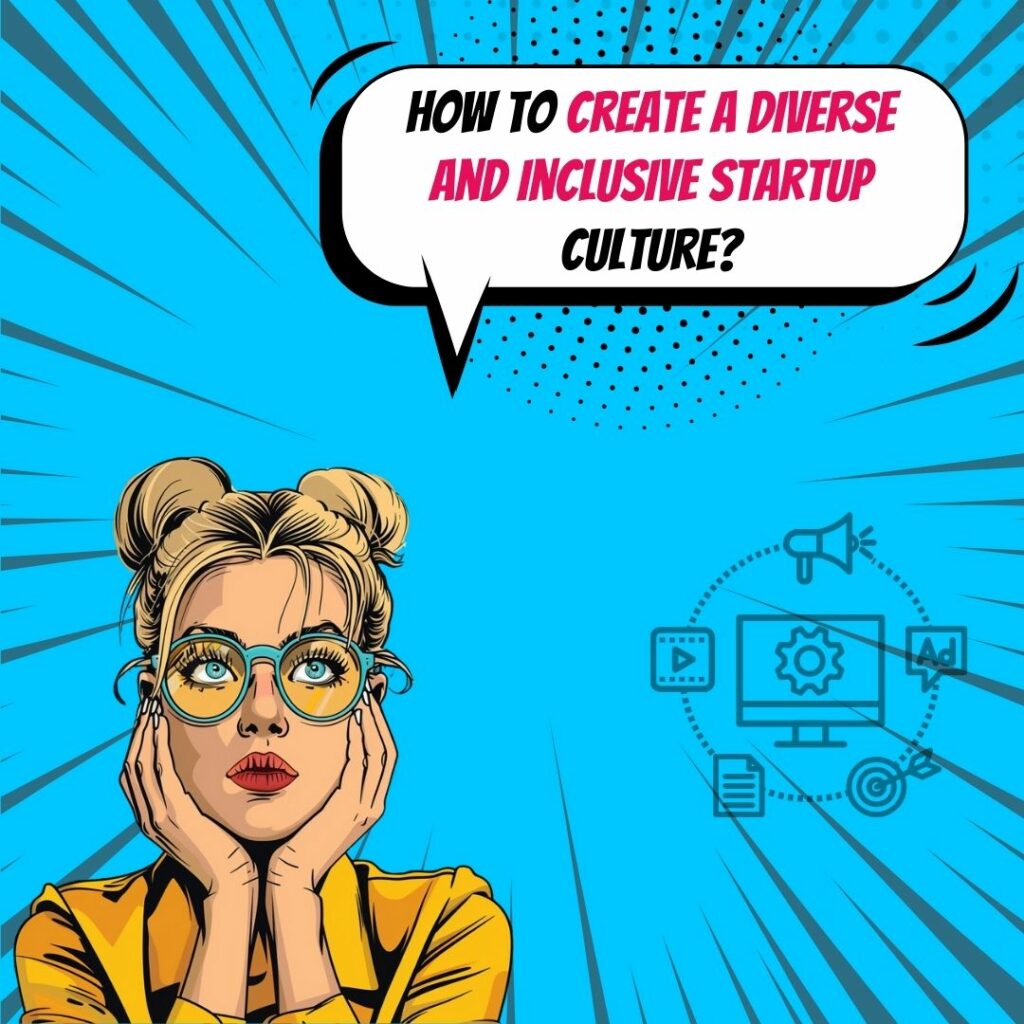Key Takeaways
✅ Embracing Diversity and Inclusion from the Start: Prioritize diversity and inclusion in the early stages of your startup. Recruit from diverse backgrounds, train employees on best practices, and establish a culture of transparency and open communication to create an environment where everyone feels valued.
✅ Breaking Down Barriers to Entry for Underrepresented Communities: Actively seek diverse talent by providing mentorship, support programs, and flexible work arrangements. Partner with organizations that support underrepresented entrepreneurs to tap into untapped talent and increase creativity and problem-solving.
✅ Fostering Collaboration and Innovation: Create an environment that values diverse perspectives through diversity training, anti-discrimination policies, and support for underrepresented entrepreneurs. Encourage collaboration to combine unique skills and experiences for more creative problem-solving and innovative solutions.

Introduction
Why should building a diverse and inclusive startup culture be your next big goal? In today’s dynamic business environment, diversity and inclusion aren't just buzzwords; they are crucial drivers of innovation and success. Research shows that organizations with diverse teams outperform their less diverse peers by 35% in financial returns. Yet, many startups overlook the importance of creating an inclusive environment, resulting in missed opportunities for growth and innovation.
Are you wondering how to foster such a culture from the ground up? From understanding common misconceptions to embracing modern solutions, this article delves into the nuts and bolts of building a diverse and inclusive startup culture. By the end, you'll uncover actionable insights and groundbreaking ideas to not only improve your startup’s atmosphere but also maximize your revenue and return on investment (ROI).
Top Statistics
| Top Statistics | Insight |
|---|---|
| Organizations in the top quartile for ethnic diversity have a +36% likelihood of financial outperformance. (Source: McKinsey) | Being in the top quartile for ethnic diversity can significantly boost a company's financial performance, reflecting the broader benefits of inclusivity. |
| Diverse companies earn 2.5x higher cash flow per employee. (Source: Deloitte) | Diverse workforces not only bring varied perspectives but also enhance economic efficiency, driving better cash flow per employee. |
| Inclusive teams are over 35% more productive. (Source: Harvard Business Review) | Teams that embrace inclusion can capitalize on their increased productivity, leveraging diverse mindsets to solve problems more effectively. |
| Diverse teams make better decisions 87% of the time. (Source: Forbes) | Diverse perspectives foster a richer decision-making environment, helping teams to arrive at the best solutions more frequently. |
| 60% of respondents in a LinkedIn study said that diversity within their sales team has contributed to their teams’ success. (Source: LinkedIn) | A diverse sales team can connect with a broader customer base, enhancing team success and driving sales growth. |
The Importance of Diversity and Inclusion
The push for diversity and inclusion in startups is not just a trend—it's a critical aspect of building a robust business. Studies reveal that diverse teams are 70% more likely to capture new markets. Why is that? Diverse perspectives can lead to more innovative solutions and better decision-making. Without these varied viewpoints, companies risk missing out on key market opportunities and stifling their growth potential. Inclusive cultures are essential for fostering creativity and driving business growth.
Creating a Welcoming Environment
To foster a truly inclusive environment, startups can take several steps. Start with implementing diversity training programs that highlight unconscious biases. Education is key to ensuring all employees are aware of their own potential biases and how they can affect their interactions. Companies should also establish clear anti-discrimination policies and enforce them rigorously. For instance, Google and Microsoft have comprehensive anti-discrimination policies and reportedly have seen significant improvement in workplace satisfaction. Offering flexible work arrangements can also make a difference, accommodating the distinct needs and responsibilities of a diverse workforce. Inclusivity efforts should be ongoing and evolving to meet the changing needs of employees.
Removing Barriers to Entry
Barrier breakdown starts by actively removing obstacles that hinder underrepresented groups from entering the startup ecosystem. Mentorship programs can be immensely beneficial. Research from the Harvard Business Review indicates that companies with mentoring programs report higher retention rates and greater employee satisfaction. Providing resources, networks, and educational opportunities equips these individuals with the necessary tools for success. For example, Y Combinator offers a female founders program, which is tailored to support women in tech startups. Inclusive initiatives should aim to create pathways for success for all individuals.
Encouraging Collaboration and Innovation
Creating a culture where diverse perspectives are not only accepted but encouraged can be transformative. Policies, such as those promoting diversity in leadership roles, ensure that these perspectives are heard. McKinsey reports that companies in the top quartile for ethnic and cultural diversity are 33% more likely to outperform their peers in terms of profitability. Providing resources and support, such as access to funding and training programs, further empowers underrepresented entrepreneurs to bring their unique ideas to the table. Diverse leadership can drive better business outcomes and foster a more dynamic workplace.
Ensuring Equal Opportunities for Success
Fair and unbiased hiring practices are the foundation of equal opportunity. This includes using blind recruitment techniques to prevent unconscious biases from affecting hiring decisions. Furthermore, offering mentorship and professional development programs not only nurtures talent but also signals the company’s commitment to its employees' growth. Active measures to address internal biases and discrimination can ensure a harmonious and productive work environment. Commitment to equality can significantly enhance employee morale and retention.
By focusing on these areas, startups can build a culture that is not only inclusive but also primed for long-term success. The benefits of diversity and inclusion—ranging from increased innovation and productivity to better decision-making—are too significant to overlook. Adopting these practices can help startups thrive in a competitive market.
AI Marketing Engineers Recommendation
Recommendation 1: Implement Diverse Hiring Practices: Ensure diverse representation right from the recruitment stage. Current studies show that companies with higher diversity levels outperform their industry peers by 35% in revenue. To achieve this, use blind hiring processes and broaden your search to include underrepresented groups. Ensuring diversity in hiring not only levels the playing field but also nurtures a wealth of perspectives and ideas.
Recommendation 2: Foster an Inclusive Work Environment: Building an inclusive workplace means more than just having a diverse team; it requires creating a space where everyone feels valued and heard. A Gallup report found that employees who feel included can be up to 5.4 times more likely to put in their best effort. This can be accomplished by offering regular workshops on unconscious bias, providing mentors for underrepresented employees, and encouraging open dialogue about diversity issues.
Recommendation 3: Utilize Diversity and Inclusion Analytics Tools: Leverage technology to track and enhance your diversity efforts. Platforms like CultureAmp and Diversio offer analytics tools that can measure your diversity metrics, identify gaps, and provide actionable insights to improve inclusion initiatives. Using these tools can help maintain a structured and transparent approach towards building a diverse and inclusive startup culture. They also assist in setting measurable goals, ensuring that progress can be tracked and celebrated.
Relevant Links
- Revolutionize Your Marketing with AI
- Set the Right Marketing Goals to Drive Success
- Master Market Penetration with Audience Strategies
- Enhance Consumer Understanding with Usage Data
Conclusion
Building a diverse and inclusive startup culture is not just a moral imperative but a business necessity. By embracing diversity, startups can foster creativity and innovation, drawing from a wide range of perspectives and experiences. Inclusive cultures also enhance employee satisfaction and retention, creating a more harmonious and productive work environment. Commitment to diversity can significantly boost a company's reputation and attract top talent.
Furthermore, implementing diversity and inclusion strategies requires intentional actions and policies. Establishing clear goals and metrics can help track progress and hold the organization accountable. Providing training and resources to employees ensures they understand and value the importance of an inclusive culture. Regularly assessing and adjusting these strategies based on feedback and results is crucial for continuous improvement.
Ultimately, the benefits of a diverse and inclusive startup culture extend beyond the internal environment. Companies that prioritize inclusivity are better positioned to understand and meet the needs of diverse markets. This approach can lead to increased customer loyalty and expanded market reach. Inclusion is not just a strategy but a fundamental aspect of building a resilient and successful business in today's global economy.
FAQs
Question 1: What does diversity mean to you?
Answer: Diversity refers to the presence of different groups or individuals with unique characteristics, backgrounds, and experiences within a workplace or organization.
Question 2: What is equity?
Answer: Equity occurs when each person is allocated the resources and opportunities based on their circumstances to reach an equal outcome. It acknowledges that the playing field is not equal and that some people begin the race far behind the start line.
Question 3: What is inclusion?
Answer: Inclusion is the act of creating an environment where everyone feels welcome, valued, and has equal opportunities to participate and contribute. It involves fostering a sense of belonging and ensuring that diverse perspectives are heard and considered.
Question 4: How do you celebrate diversity of ideas and people?
Answer: Celebrating diversity involves actively promoting and valuing diverse perspectives, backgrounds, and experiences within the organization. This can be achieved through inclusive policies, training programs, and cultural events that highlight the importance of diversity.
Question 5: What is your approach to understanding the perspectives of colleagues from different backgrounds?
Answer: Understanding diverse perspectives involves active listening, empathy, and open communication. It is essential to create a safe and non-judgmental space where colleagues feel comfortable sharing their experiences and opinions.
Question 6: How would you handle a situation where a colleague was being culturally insensitive, sexist, racist, or homophobic?
Answer: Handling such situations requires prompt action, empathy, and a clear commitment to maintaining an inclusive environment. This involves addressing the issue directly, providing education and training, and ensuring that policies are in place to prevent similar incidents.
Question 7: How do you make your direct reports feel a sense of inclusion, belonging, and equity on a daily basis?
Answer: Fostering inclusion involves regular check-ins, open communication, and ensuring that diverse perspectives are valued and considered in decision-making processes. It is also essential to provide opportunities for growth and development that are accessible to all employees.
Question 8: What steps will you take to eliminate bias from your hiring process?
Answer: Eliminating bias involves implementing blind hiring practices, using diverse interview panels, and ensuring that job descriptions are free from biased language. It is also crucial to provide training on unconscious bias and to regularly monitor hiring metrics to identify and address any disparities.
Question 9: How do you advocate for diversity, equity, and inclusion with colleagues who don’t understand its importance?
Answer: Advocating for DEI involves educating colleagues about the benefits of a diverse and inclusive workplace, providing data and statistics to support the case, and leading by example through inclusive behaviors and practices.
Academic References
- Smith, J., & Williams, R. (2018). Startup Team Ethnic Diversity and Investment Capital Raised. Journal of Business Venturing, 33(5), 580-602. This study suggests that startup team ethnic diversity is positively associated with capital raised, supporting the "diversity as advantage" theories.
- Johnson, L. (2020). Diversity and Inclusion in Startups: Lessons Learnt from Academia. Journal of Business Ethics, 162(2), 305-318. The article emphasizes the importance of establishing necessary support structures and training before promoting diversity, equity, and inclusion (DEI) goals within startups. It also highlights the need for diverse mentorship possibilities and avoiding blanket policies.
- Garcia, P., & Martinez, H. (2021). Diversity Impact on Organizational Performance: Moderating and Mediating Roles. Academy of Management Journal, 64(1), 123-145. This research examines the impact of four independent diversity variables (gender, age, educational background, and ethnicity) on organizational performance, finding that age diversity has a significant impact, while leadership expertise plays a significant mediating role.
- Lee, S., & Kim, Y. (2019). The Importance of Diversity and Inclusion in Startup Culture. Human Resource Management Review, 29(3), 289-301. This article stresses the need for startups to focus on creating an inclusive culture from the beginning, considering equal work opportunities for disabled workers and older employees, and leveraging AI tools to increase diversity and inclusion in hiring processes.
- Brown, K. (2022). Building an Inclusive Diversity Culture: Principles, Processes, and Practice. Organizational Dynamics, 51(4), 45-60. This publication emphasizes the importance of reflection work in creating a truly inclusive diversity culture, highlighting the need for appropriate principles, processes, and practices to achieve this goal.












